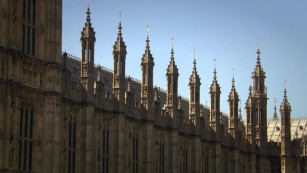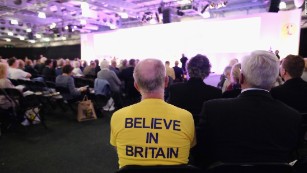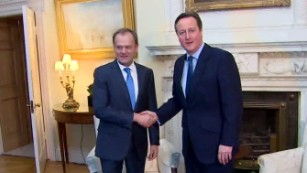Cameron: We have a deal with the EU
European Union leaders reached a deal Friday to keep Britain in the organization with "special status," UK Prime Minister David Cameron announced, saying he'll present the deal to his cabinet on Saturday morning.
If approved by the cabinet, the issue would go to the British people in a referendum -- perhaps as early as June -- that would be "a once-in-a-generation moment to shape the destiny of our country," Cameron said at a news conference.
After two days of tense talks in Brussels, Belgium, with other EU leaders, Cameron said the EU provided the concessions he sought, including assurances that the other nations won't try to make Britain part of a "European superstate."
"There will be tough new restrictions on access to our welfare system for EU migrants," he said. "No more something for nothing. Britain will never join the euro, and we've secured vital protections for our economy and a full say over the rules of the free trade single market while remaining outside the euro."
World leaders praise deal
World leaders praised the deal, with German Chancellor Angela Merkel saying the EU leaders clearly wanted Britain to stay.
"We believe we have now given a package to David Cameron to elicit support in Britain for Britain remaining a member of the European Union," she said. "This was his goal after all. There was no doubt about it."

A British exit from the EU won't be cheap or easy
At the heart of the talks among the 28 EU heads of government were Britain's demands to play by special rules within the union. The demands left some EU leaders cold, but there was no great appetite to see a British exit from the EU -- or "Brexit," as it has come to be known.
A British departure would leave the EU diminished. It would lose its second-largest economy -- behind that of Germany -- and one of its two permanent seats on the U.N. Security Council. (France holds the other)
Cameron was upbeat at his news conference, saying, "Our plan for Europe gives us the best of both worlds."
Britain would maintain full access to the EU's free-trade market and benefit from Europe-wide cooperation on crime and terrorism, he said.
But Britain would not have to cooperate in "the parts of Europe that don't work for us," such as the euro currency and eurozone bailouts, Cameron said.
"I have negotiated a deal to give the United Kingdom special status inside the European Union," he said. "I will fly back to London tonight and update the cabinet at 10 a.m. tomorrow morning."
Benefits to migrants a key issue
The EU sprang from the ashes of World War II as a free-trade zone. Its signal achievement has been to allow free movement of goods and people in the hope that economic integration would prevent a new continental war.
Britain opted out of both those EU provisions, and it views with skepticism the EU's effort to branch into new fields, regulating everything from pesticides to human rights, and creating a unified foreign policy, too.
Merkel said Britain's demand not to pay benefits to migrants from other EU countries had been a sticking point.
"All of the different baskets of the requests of Britain on the agenda were discussed, and it is true that not each and every one around the table had it all that easy to agree to those requests, but there is a will," Merkel said Thursday.

What is Brexit?
Cameron also wanted to opt out of the standard EU commitment that its members must work toward "ever closer union" -- a goal that has animated the European project for decades.
He wants Britain exempted from having to give various social benefits to newcomers -- even from other EU countries -- until they have lived in the UK for several years.

Police spray tear gas at migrants trying to access the Channel Tunnel in France.
Past problems with the EU
Britain has resisted the "ever closer" ties with the EU. It is not a member of the Schengen Agreement, which allows for passport-free travel among most European countries. And when many EU countries scrapped their national currencies in favor of the euro, Britain said it would stick with the pound.
The country's difficult relationship with the EU is nothing new. In the 1960s, French President Charles de Gaulle not only opposed Britain's entry into what was then called the Common Market, he also opposed any negotiations on the topic.
Britain didn't join the European Community, as it was then called, until 1973, by which time de Gaulle was dead.

Will Britain stay in the EU?
There's no assurance the British people will approve the referendum.
The historic number of people fleeing conflict and poverty in the Middle East and North Africa -- most of them bound for Europe -- increases the chances that Britons, fearful about their jobs and their national identity, will try to pull up the drawbridge and go it alone.
Furthermore, while Cameron expects to campaign for Britain to stay in the EU, his Conservative Party is divided on the issue, with some senior members favoring an EU exit.
For his part, U.S. President Barack Obama has urged Britain to stay in the EU. The UK as a member of the EU "gives us much greater confidence about the strength of the trans-Atlantic union," Obama said in July.
Donald Tusk, president of the European Council, said the agreement doesn't compromise "our fundamental values."
"I deeply believe that the United Kingdom needs Europe and Europe needs the United Kingdom," Tusk said. "To break the link now would be totally against our mutual interest. We have done all we could not to let that happen. But the final decision is in the hands of the British people."
Belgian Prime Minister Charles Michel tweeted: "We overcame our differences to reach a good #agreement. Now up to British people to decide. Good luck @David_Cameron."
Cameron said economics wasn't the only reason to stay in the EU. Security was another issue, especially in the age of terrorism, Cameron said.
"This, in my view, is a time to stick together, a time for strength in numbers," he said.
News Courtesy: www.cnn.com











